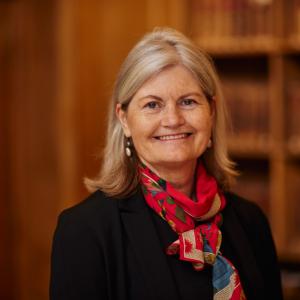OCRN Series x EELC: Transnational Learning Exchange: Law and Activism: Incompatible or Mutually Reinforcing?
Tshegofatso Phala, Executive Director of the Equal Education Law Centre; Shameem Ahmad, CEO of the Public Law Project
The relationship between law and activism is an issue that has recently risen to prominence on the global stage. The debates encompass both legal research and legal practice. Some argue that high-quality, ethical legal research or legal practice or both are incompatible with certain aspects of activism. Others emphasise synergy between the two. Others still say that law and activism – or at least law and politics – can never be fully separated and that it is disingenuous to suggest otherwise.
The Oxford Children's Rights Network Series in partnership with the Bonavero Institute of Human Rights has the pleasure of hosting Equal Education Law Centres’ transnational learning exchange which is aimed at offering an opportunity to deepen these debates, where practitioners and academics in the UK and in South Africa can learn from the similarities and differences between their respective experiences.
Founded over 10 years ago in 2012, the Equal Education Law Centre (EELC) is a public interest litigation organisation established in order to further the struggle for education justice in South Africa. EELC was formed in recognition of the crucial link between social mobilisation and social change. Building the power of those who are social and economically disadvantaged within the schooling system is fundamental to the work of the EELC. Key to the EELC’s way of working are the concepts of movement lawyering and legal activism.
The aim of this roundtable is to bring together students, legal practitioners and academics from South Africa and from the UK to exchange and learn from one another’s experiences and perspectives on the relationships between law and activism.
Speakers

Tshegofatso Phala
Tshego is the Executive Director of the Equal Education Law Centre. Tshego is an accomplished public interest lawyer with over 10 years’ experience in public interest litigation in South Africa. In the course of her practice, Tshego has been part of a number of landmark cases that advanced the rule of law and constitutional democracy in South Africa, as well as the protection and advancement of the rights of LGBTQI persons (with particular focus on LGBTQI youth, transgender and intersex persons). Tshego has a passion for human rights and the protection of vulnerable and marginalised persons and communities in society. She believes that movement-led lawyering and community lawyering are crucial to bringing about social change.

Shameem Ahmad
Shameem Ahmad is the CEO of Public Law Project. She began her career as an advisor in Government, developing policy and legislation in the wake of the financial crisis. She then went to the City where she became a senior associate and solicitor advocate in a market leading public law team. She has represented individuals, corporates, public bodies and charities. Prior to becoming its Director of Advocacy, Shameem helped set up the Black Equity Organisation, a racial justice charity.

Professor Tarunabh Khaitan
Tarunabh Khaitan is the Head of Research at the Bonavero Institute of Human Rights at the University of Oxford, the Professor of Public Law and Legal Theory at the Faculty of Law at Oxford, a Fellow at Mansfield College, an Honorary Professorial Fellow at Melbourne Law School, and a Visiting Professor of Law at Harvard Law School. He specialises in legal theory, constitutional studies, and discrimination law.

Chair: Professor Kate O'Regan
Professor Kate O’Regan is the inaugural Director of the Bonavero Institute of Human Rights and a former judge of the South African Constitutional Court (1994–2009). In the mid-1980s she practiced as a lawyer in Johannesburg in a variety of fields, but especially labour law and land law, representing many of the emerging trade unions and their members, as well as communities threatened with eviction under apartheid land laws. In 1990, she joined the Faculty of Law at the University of Cape Town where she taught a range of courses including race, gender and the law, labour law, civil procedure and evidence. Since her fifteen-year term at the South African Constitutional Court ended in 2009, she has amongst other things served as an ad hoc judge of the Supreme Court of Namibia (2010–2016), Chairperson of the Khayelitsha Commission of Inquiry into allegations of police inefficiency and a breakdown in trust between the police and the community of Khayelitsha (2012–2014), and as a member of the boards or advisory bodies of many NGOs working in the fields of democracy, the rule of law, human rights and equality.


